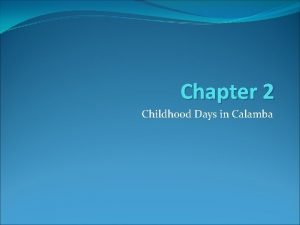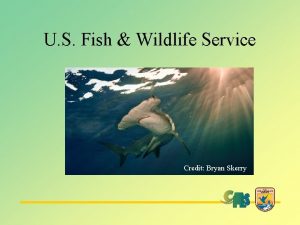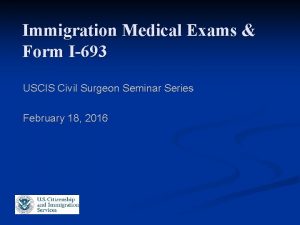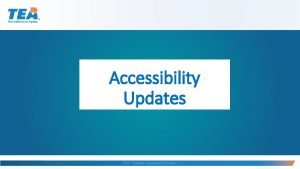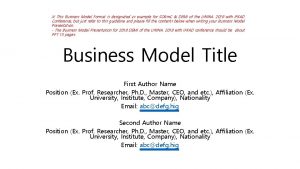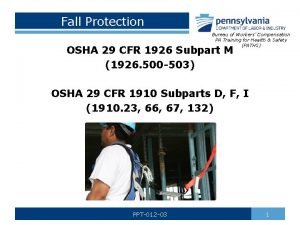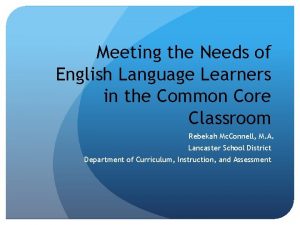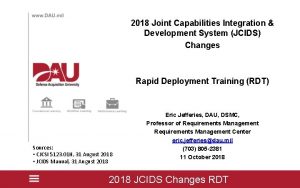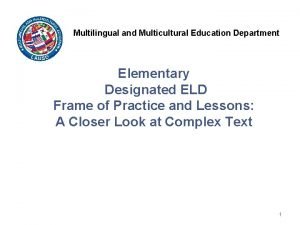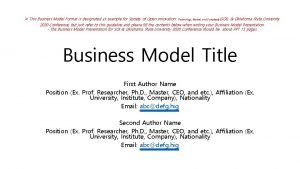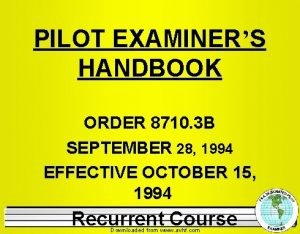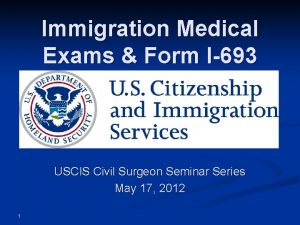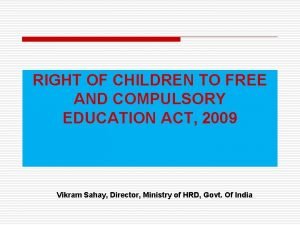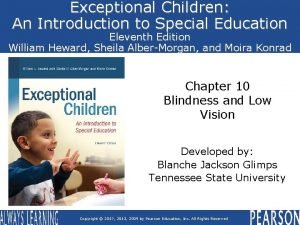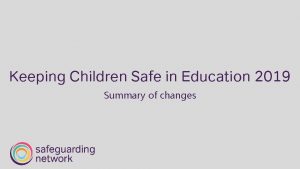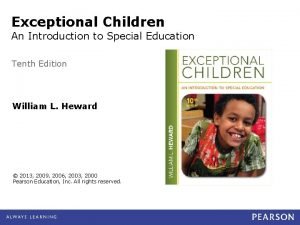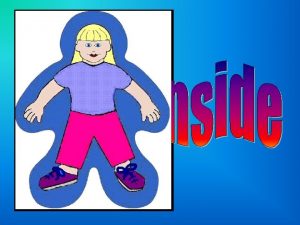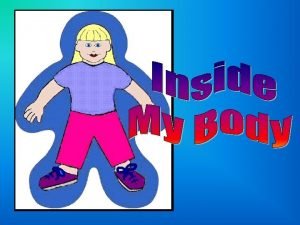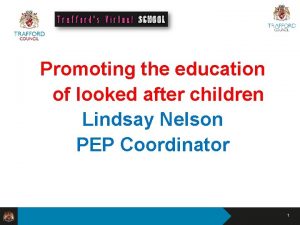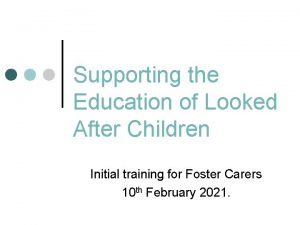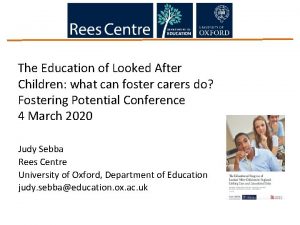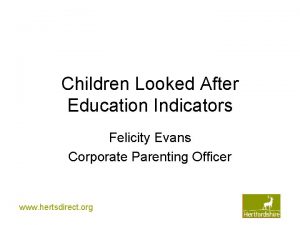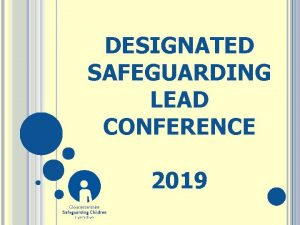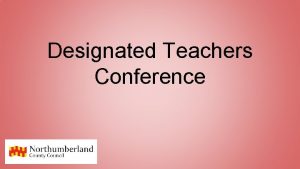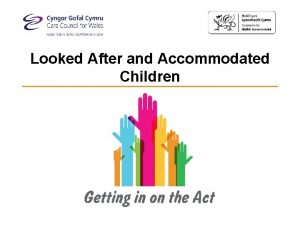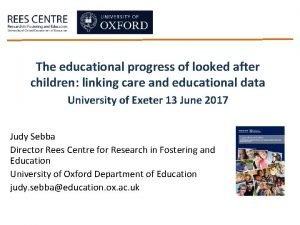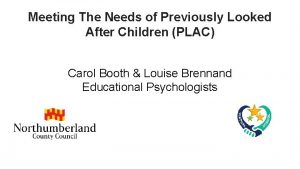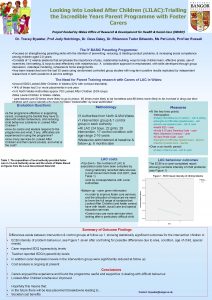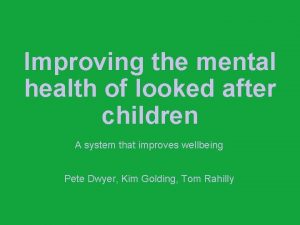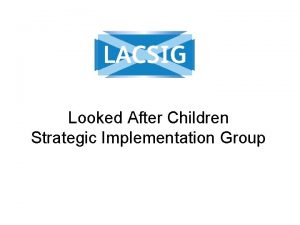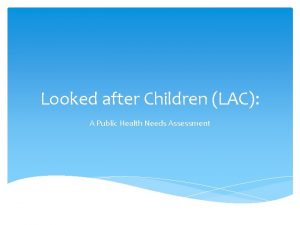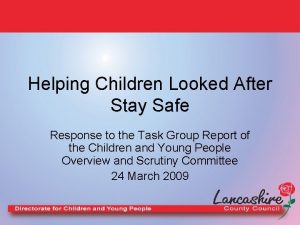Education of Children Looked After Designated Teachers Network































- Slides: 31

Education of Children Looked After Designated Teachers Network Meeting February 2021

Rachel Clemow – Interim Service Manager Inclusion Michelle Amberry – Interim Virtual School Head Jessica Hitchen - Pastoral Manager Contact 07824 481532 admin. virtualschool@wigan. gov. uk

• Introductions and welcome to new team members • Microsoft teams protocols. • How to ask questions.

• Safeguarding – sharing information • Attendance information and records • Virtual School Support Offer • National Tutoring Programme - Randstad BREAK • Pupil Premium Plus • Personal Education Plans and data capture • Training update • Any other business

There should be clear steps for staff and volunteers to follow if they have concerns about or become aware of young people sharing explicit images or videos of themselves or others. Your nominated child protection lead should take the lead on responding to incidents of sexting, working closely with your senior leadership team. They should also liaise with agencies such as the police or children’s social care as appropriate. It's best practice never to view any sexting images. If the image is on a device belonging to your organisation, you need to isolate it so that nobody else can see it. This may involve blocking the network to all users. You should never copy, print or share sexual images of a child or young person (Childnet, 2016; UKCCIS, 2017 a and 2017 b).

In England Wales, the Protection of Children Act 1978 makes it an offence to take, make, show, distribute, possess (with a view to distribute) or publish an indecent photograph or pseudo-photograph of a child. Part 11 of the Criminal Justice Act 1988 makes it an offence to possess indecent images of children (whether or not you intend to distribute them). You should only search devices if the child is at immediate risk of harm. The Department for Education (Df. E) provides guidance for head teachers, staff and governing bodies in England on searching electronic devices (Df. E, 2018).

You should make a child protection referral if: • the incident involves an adult • there is reason to believe that a child or young person has been coerced, blackmailed or groomed, or there are concerns about their capacity to consent (for example, if they have a learning disability) • what you know about the image(s) suggests the content depicts sexual acts which are unusual for the young person’s developmental stage, or are violent • the image(s) involves sexual acts and any child in the image(s) is under 13 • you have reason to believe a child or young person is at immediate risk of harm due to the sharing of the image, for example if they are presenting as suicidal or self-harming.

Further guidance and information can also be found in government guidance: • Sharing nudes and semi-nudes: advice for education settings working with children and young people • http: //www. legislation. gov. uk/ukpga/1978/37 • https: //www. legislation. gov. uk/ukpga/1988/33/contents • https: //www. gov. uk/government/publications/searchingscreening-and-confiscation

Attendance Headlines Autumn Attendance Sep – Dec 2020 All CLA • CME – 0 • Average attendance 90. 5% • Less than 90% - 22% (PA) (88/406) • Less than 95% - 37% (151/406) • Above 95% - 63% (254/406) • 100% - 8% (32/406) Exclusions • No of CLA received a FTE 8% (31/406) • No of sessions missed – 134 • No of FTE issued 48 Attendance Spring Term 2021 • 276 / 410 • 67% have present marks.

Part-timetables & CME • 5 CLA are currently registered as Part-time • Schools are required to notify the Pupil Inclusion Team if a child is accessing a reduced offer and complete a form • Part-time offers should be time limited, recorded in the PEP and used as a re-integration strategy to support children back into a setting • Currently 0 registered as CME

School expectation and attendance for CLA “During the period of national lockdown, primary, secondary, alternative provision and special schools will remain open to vulnerable children and young people and the children of critical workers only. Vulnerable children and young people include those who: • Are assessed as being in need under section 17 of the Children Act 1989, including children and young people who have a child in need plan, a child protection plan or who are a looked-after child Schools should continue to record attendance in the register. Schools should follow up on absences of the pupils who are expected to be in school but where a parent wishes for their child to be absent, we expect schools to authorise the absence during this national lockdown period. Absence will not be penalised. ” https: //www. gov. uk/government/publications/actions-for-schools-during-thecoronavirus-outbreak

If vulnerable children and young people do not attend, schools should: • work together with the local authority and social worker (where applicable) to follow up with the parent or carer to explore the reason for absence, discussing their concerns using supporting guidance considering the child’s circumstances and their best interests • work together with the local authority and social worker (where applicable) and other relevant partners to encourage the child or young person to attend educational provision, particularly where the social worker agrees that the child or young person’s attendance would be appropriate Wigan Local Authority asked for any decisions for a child looked after to not take their place in school, to be agreed through a care planning.

Recording attendance • All pupils who are not eligible to be in school should be marked as Code X. They are not attending because they are following public health advice. • As vulnerable children are still expected to attend school full time, they should not be marked as Code X if they are not in school (except if they are shielding, self-isolating or quarantining). If the parent of a vulnerable child wishes their child to be absent, the parent should let the school know. The Department expects schools to grant applications for leave of absence given the exceptional circumstances. This should be recorded as code C (leave of absence authorised by the school) unless another authorised absence code is more applicable.

Virtual School Support Offer • Every school has a named link from our team – Education Support Worker (ESW). • This ESW is school’s point of contact. • The VST are monitoring school attendance and are available to support with any barriers for those children at home accessing remote learning. This could be a telephone call, a doorstep visit or a walk and talk with a child they have an existing relationship with for example. • Key information about which of our children appear to not have been contacted by settings on a given week is extracted from the larger vulnerable list collation – information has to be received by Friday lunchtime of that current week, to inform the updated list from which we filter our information • Any requests to support a child in school, will come via school to their link and back to our team meeting each week for consideration.

• Your link will gather information to share with the wider team to decide: • Is the Virtual school best placed to deliver that specific support? • How long is the support likely to be needed? • What outcomes are we hoping to achieve? • Can we access support from other services to work alongside us? • Any offer of support will be time-limited and will be to re-engage young people with relationships with school staff and create a sustainable support offer: • Engaging in remote learning • Attendance • Mentoring for SEMH • Signposting to other initiatives • This support may be: • Doorstep visits • (Home visits) • Phone calls • Direct work and mentoring sessions in school or at home

National Tutoring Programme Randstad Karen Guthrie

National Tutoring Programme Tutoring offer from Pupil Premium Plus for Y 11 to support remote learning offer and thinking ahead to Y 12 next steps for our young people We will communicate with Designated Teachers of our Y 11 pupils before half term and ask that you consider this offer for your cohort: • Will this be supportive to that young person at this time? • Have they accessed tutoring already via National Tutoring Programme? • Are they already accessing tutoring – would this enhance or not? Designated Teacher details will be passed through to Randstad who will then manage the process alongside you Consent needs to be gained in consultation with the child’s social worker


Pupil Premium Plus • Applications deadline was 23. 10. 20 • Initial allocation will be based on £ 1, 000 per pupil • £ 333 at the end of the Autumn term • £ 250 at the end of the Spring term • £ 417 at the end of the Summer term – adjusted if school requested less than £ 1000 per pupil • Additional bids will be considered together and allocated according to need • Additional funds will be released in 2 phases • 70% in December • 30% in March • If you have 10 CLA and your funding is approved at £ 15, 000 you will receive: Autumn Term Spring term Summer term Total £ 1, 000 per pupil baseline £ 3, 330 £ 2, 500 £ 4, 170 £ 10, 000 Additional funding approval £ 3, 500 £ 1, 500 0 £ 5, 000 Total payment £ 6, 830 £ 4, 000 £ 4, 170 £ 15, 000

Pupil Premium Plus Exceptional request for new CLA and escalating issues • February 2021 & May 2021 will provide an adjustment opportunity, to influence the end of term payments • Amended mid year application form will be available on Services for Schools from 12. 2. 21 • Deadlines for return via secure email to admin. virtualschool@wigan. gov. uk of 26 th February 2021 and 11 th June 2021 • You will be asked to provide information of current allocated funding for the year, evidence of impact and commitment for this funding including any changes to plan due to the national lockdown and reasons why you wish to request additional funding • Requests will be considered according to need, alongside PEP information and where funding remains available over and above the commitment already made through the October 2020 submissions

PEP Headlines • High rate of completion and “green” final PEPs • For the Spring term, there will be an acknowledgement of the impact of lockdown, when PEPs are audited • There is an expectation that the document is completed in full where possible • The spring PEP should start with the Autumn PEP document – some tabs are added to, some are overwritten. There are plans for next academic year to add in separate tabs for each term • PEP training sessions are available to book onto, via Services for Schools – these are also a good opportunity to ask the team questions and refresh your understanding

• A formal meeting does not need to take place but there should be evidence of inclusive discussion where all key professionals and the young person have had input into an agreed plan. • A minimum of 3 reviews a year but some children may need more frequent adaptations to their plans. The social worker will now chair the meeting • The designated teacher will now record the discussion and actions • Documents are to be shared securely via email whilst the information is finalised.

The designated teacher has a key role in making sure the PEP is effective in supporting everyone to help the looked-after pupil to make good educational progress. PEPs should: • identify developmental and educational needs in relation to skills, knowledge, subject areas and experiences; • set short and long-term educational attainment targets agreed in partnership with the child and the carer where appropriate; • include a record of planned actions, including milestones on homework, extra tuition and study support, that the school and others will take to promote the educational achievement of the child, based on an assessment of their educational needs; • include information on how the child’s progress is to be rigorously monitored; • record details of specific interventions and targeted support that will be used to make sure personal education targets are met, especially at the end of Key Stage 2 in relation to English and mathematics, and at Key Stage 4 in achieving success in public examinations;

Services for Schools Portal for all Wigan looked-after pupil documents http: //be. wigan. gov. uk/thevirtualschoolteam

Data collections • Data collections will still be via Perspective or Secure docs (CLA PROJECT). Please submit the latest PEP for us to audit and collect data from • PEPs need submitting within 5 days of a PEP review – do not wait until the final submission deadline

Data collections

Data collections

OPPORTUNITIES FOR PROFESSIONAL DEVELOPMENT • Support resources distributed to all Wigan schools from TESS and EPS: http: //be. wigan. gov. uk/Services/4580 • Wellbeing in Education Return (WER) resources – the presentations from all the sessions will be on here shortly, with voiceovers to be used within your settings

Wellbeing for Education Return • A national training package providing guidance and resources for education staff on responding to the impact of Covid-19 on the wellbeing of their students and pupils. • Supervision for headteachers • Facebook closed group – A Graduated Approach to Wellbeing • Review sessions

Virtual school Team Contact 01942 486180 admin. virtualschool@wigan. gov. uk

Thank you for your time Any Questions
 After me after me after me
After me after me after me If any man wants to come after me
If any man wants to come after me What is the first sad memory of the young jose?
What is the first sad memory of the young jose? Pam ayre
Pam ayre Kim kroll
Kim kroll Usfws designated ports
Usfws designated ports Uscis civil surgeon locator
Uscis civil surgeon locator Tea content and language supports
Tea content and language supports Designated format
Designated format A is a work area designated and clearly marked in which
A is a work area designated and clearly marked in which Integrated eld vs designated eld
Integrated eld vs designated eld Designated teacher training
Designated teacher training All performance attributes designated as joint performance
All performance attributes designated as joint performance Designated eld lesson plans
Designated eld lesson plans Utiitsl psa registration
Utiitsl psa registration Designated format
Designated format Flight examiners handbook
Flight examiners handbook Civil surgeon worksheet
Civil surgeon worksheet National association of special education teachers
National association of special education teachers Child centred curriculum
Child centred curriculum Introduction of exceptional child
Introduction of exceptional child Keeping children safe in education 2019
Keeping children safe in education 2019 Exceptional children an introduction to special education
Exceptional children an introduction to special education One day joynal looked for work
One day joynal looked for work Looked but failed to see accidents
Looked but failed to see accidents Don't delay dawns disarming display. dusk demands daylight
Don't delay dawns disarming display. dusk demands daylight Once upon a time there lived a number of mice in a house
Once upon a time there lived a number of mice in a house Thomas robinson tkam
Thomas robinson tkam Powerful verbs for walked
Powerful verbs for walked Have you ever looked in the mirror and thought
Have you ever looked in the mirror and thought Have you ever looked
Have you ever looked God looked at everything he had made
God looked at everything he had made


